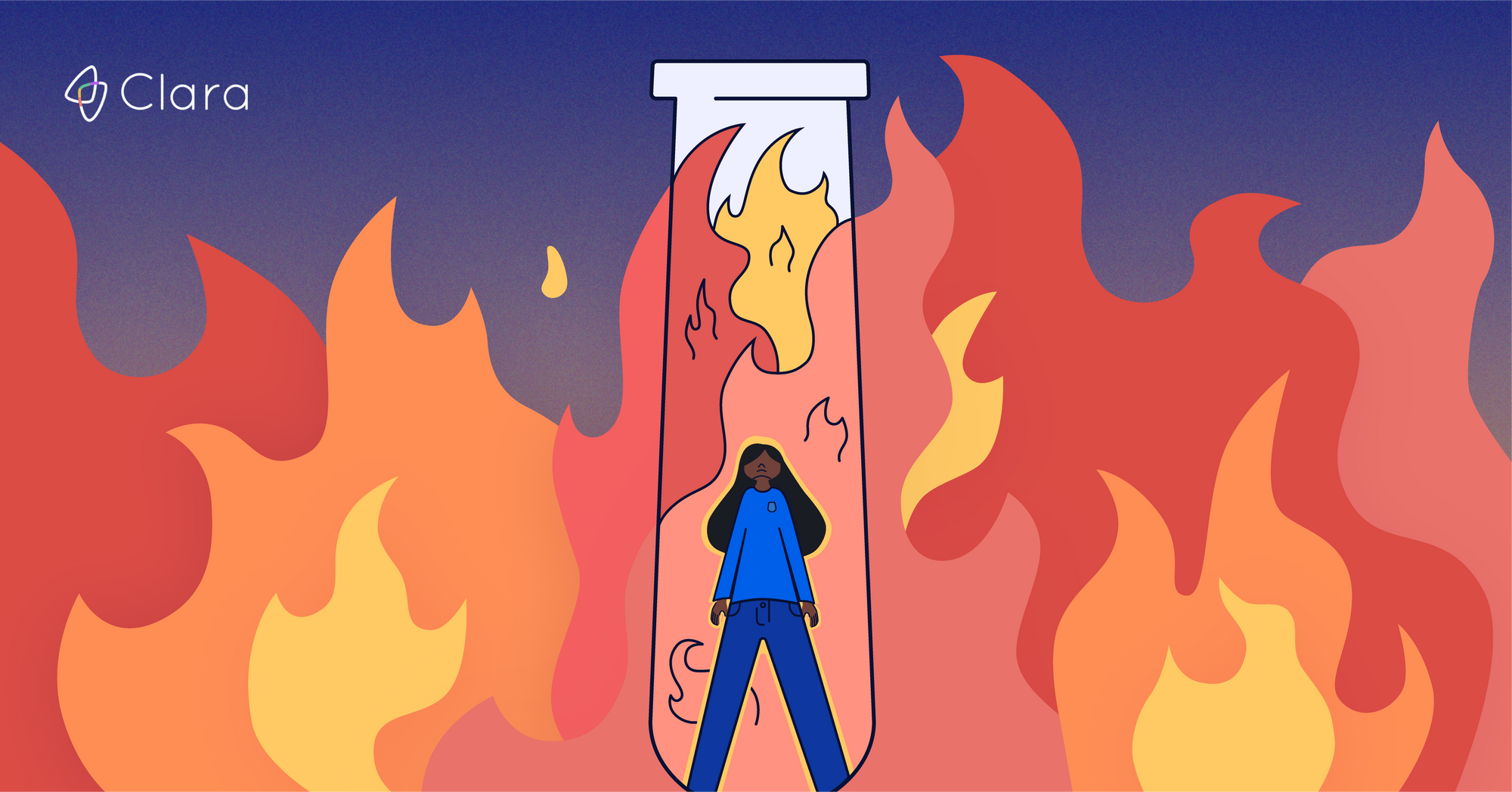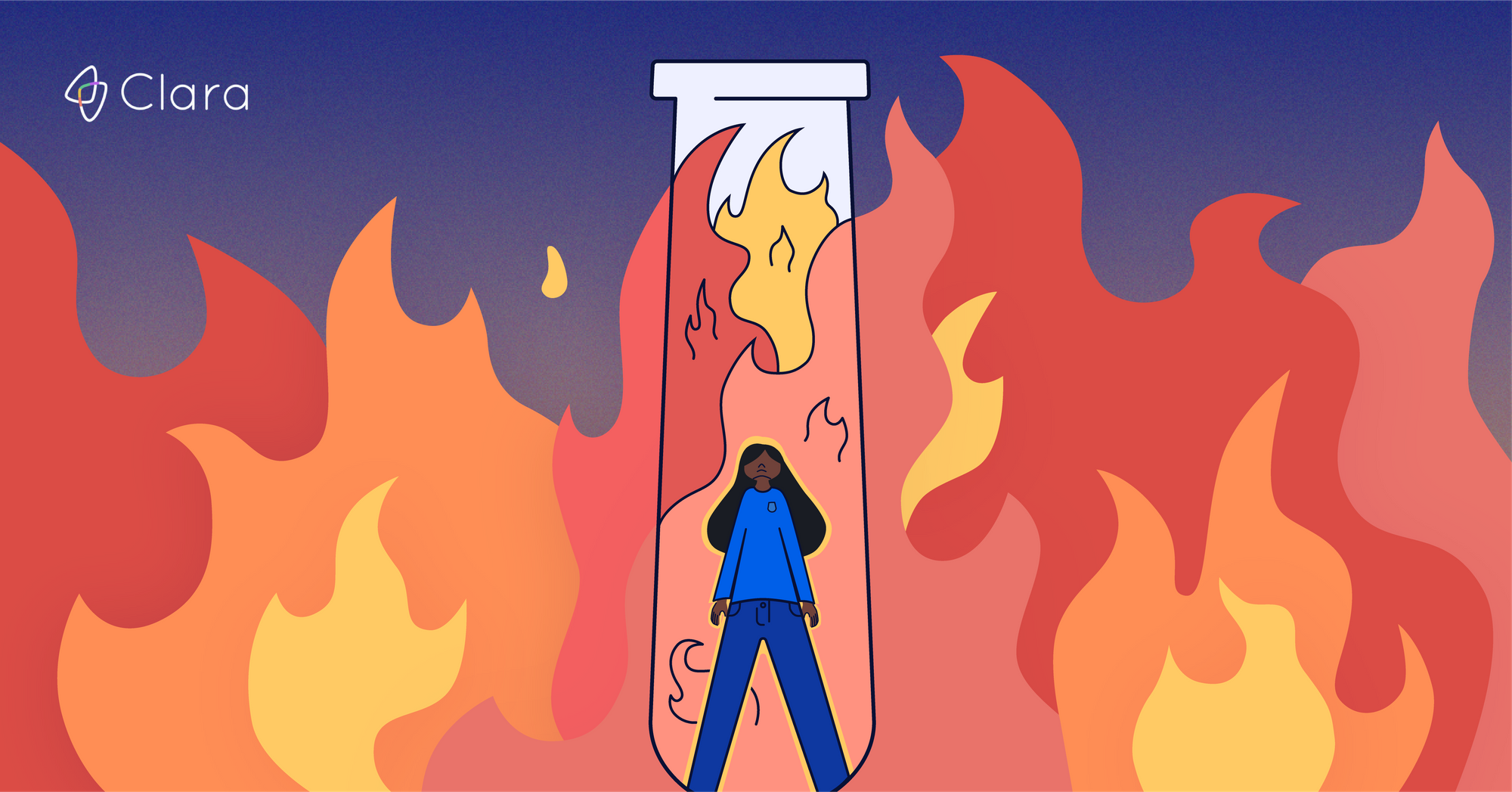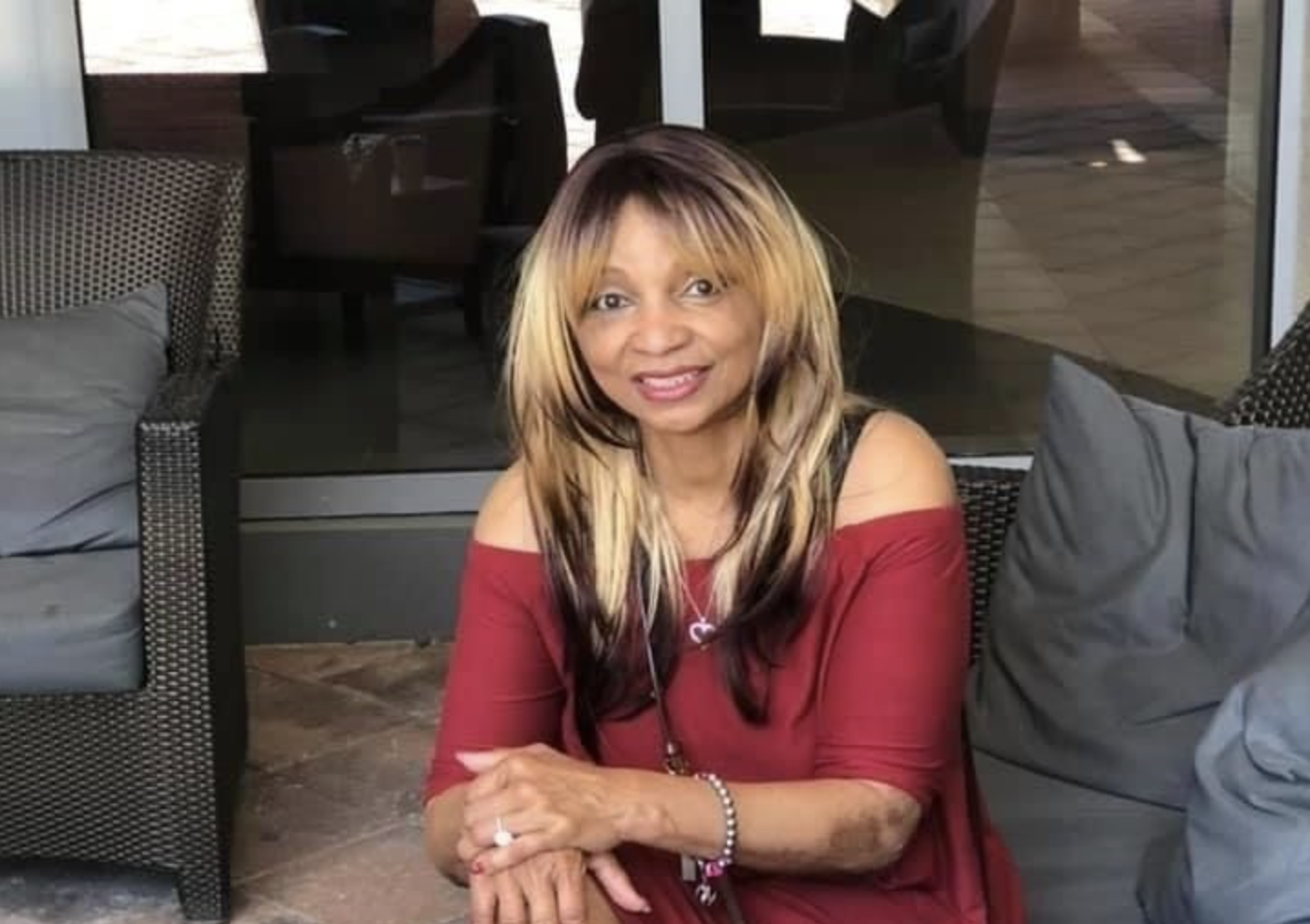Hi everyone, and welcome to the Patients Have Power podcast! This is our first video podcast that we are doing with a patient advocate (and not Aaron). We love Aaron, but this is exciting to have a patient advocate with us on video (link coming soon!). Our latest Patients Have Power episode is called "Patients are the end client at the end of the day.", (You can subscribe to the podcast at Apple Podcasts, or listen to it with the media player above).
Leilani is an advocate in the transplant and chronic illness community. She stopped by the Clara offices to talk about her experience receiving a heart transplant, what drives her to her advocacy, and how patients need to be treat like the user of any healthcare system.
Below is a transcript of the episode for your reading pleasure!
Lilly Stairs: Leilani, thank you so much for being here with us today.
Leilani Graham: Of course!
Lilly Stairs: Leilani is a patient advocate, particularly for the transplant and chronic illness community. She has this really remarkable story that I'm so excited for you to share with us.
And, she's taken that story and used it to be an advocate for others. So we've got some fun stuff to talk about today, some really interesting stuff to talk about today.
So I wanna dive right in!
Leilani Graham: Awesome.
Lilly Stairs: Can you share your story with us? What brought you to this point?
Leilani Graham: Yeah, absolutely. So, when I was 13 years old, I was diagnosed with hypertrophic cardiomyopathy, which is essentially the over-thickening of the left ventricle of the heart. And what that meant was that my heart was always at risk of a sudden cardiac arrest.
But even at 13, I didn't feel like I was a sick kid. It was kind of in my social stratosphere, more like:
"This is Leilani, and she also has this funny little box that can shock her back to life if something goes wrong!"

Leilani Graham: And so, I didn't really feel like a patient until I was listed for heart transplant. At that time I had survived four cardiac arrests, and we decided that my decline was so significant that there was pretty much no alternative therapy. So, I was listed for transplant.
And at that point, I felt really alone. I didn't know anyone else who was 23 who'd been listed for a heart transplant.
Leilani Graham: And I received my transplant on February 3rd of 2016. And the next day, I coded.
The donor heart essentially was not responding, and so I was put on an extracorporeal membrane oxygenator, which essentially takes all the blood out of your body, mechanically oxygenates it, and returns it to your body.
Lilly Stairs: Wow. And I just cannot even imagine. That must have been terrifying.
Leilani Graham: It was, especially because the biggest surgery I'd had to that date was inserting a small implant which goes into your heart, but is pretty much a one and done procedure.
And so, I ended up having four open hearts within a week and a half.
Lilly Stairs: That's really tough for my brain to even comprehend. Four open heart surgeries? Like, take a moment to think about that, people. I mean, really. One open heart surgery is more than enough for a person in their lifetime. And four in one week. That's a lot on your body, too.
Leilani Graham: Yeah, it really was. And so of course there were complications that arose as part of that, being bedridden and all that.
So then I felt even more isolated.
Not only am I a transplant recipient at 24, but I didn't know anybody who'd had the same complications that I had.
Lilly Stairs: Right, right.
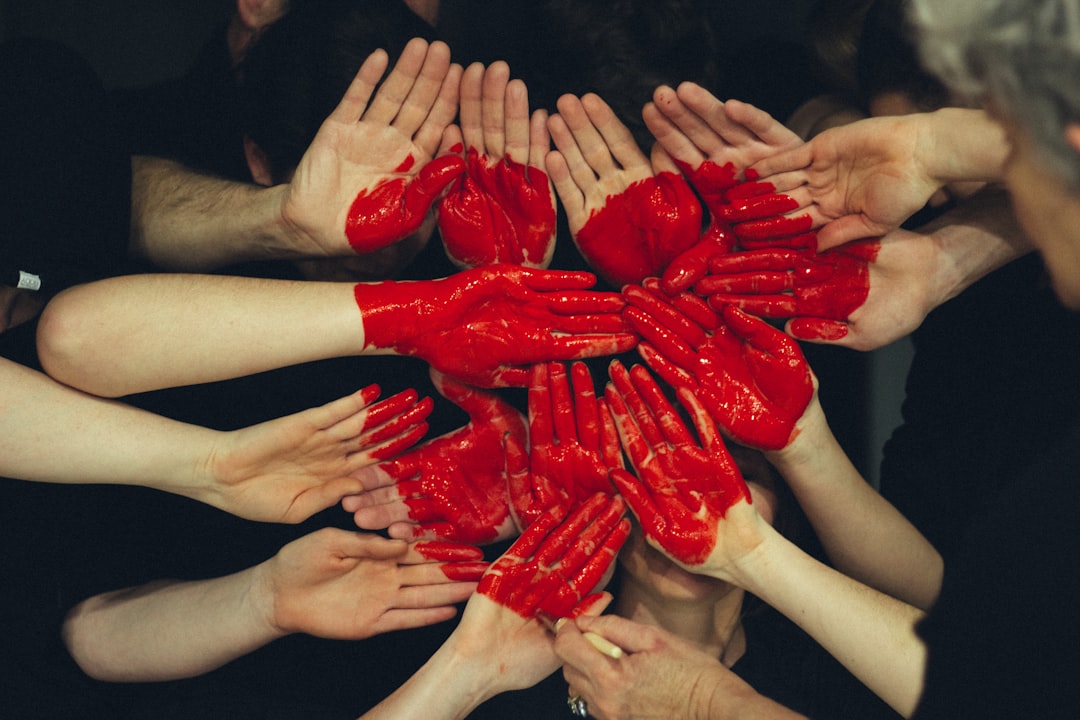
Leilani Graham: And so I started sharing my story - partly as a way to update my family and friends, but also in the hopes that I would find others like me, if you will.
And at that point, people kind of started coming out of the woodwork. I heard from nurses and physicians and residents that they might have had a patient who had a somewhat similar experience, or was also a young transplant recipient, or who was waiting for a transplant and needed someone to talk to.
And then it turned into not only me being able to commiserate or celebrate with these other patients, but also to help them in their journey.
Lilly Stairs: Sure. And were there moments where, now you're helping so many other patients, you're helping guide them through this journey.
Were there moments in your own journey where you wish you had someone like yourself, who had been there before to help guide you?
Leilani Graham: Absolutely. Yes. I had so many questions back then. And doctors only have 15 minutes with you, often, to talk about the possibilities of what can arise. So you're left googling things, which can bring mixed results.
And I was really fortunate to have a team that I was so close to pre-transplant who could answer a lot of those questions. But even then, they hadn't been through something that significant.
So, I really had wished, at that time, that there was someone who could kind of virtually hold my hand and say:

"You're gonna get through this. I've been through this."
Lilly Stairs: So, okay, now you're advocating - and I know that you're out and about doing all kinds of speaking engagements, and helping consult with companies.
What are some of the issues that you are most passionate about when it comes to the community that you're working with?
Leilani Graham: Yeah. I think a couple things:
Precision medicine.
The first is precision medicine. I think there are a lot of patients who feel almost kind of oppressed or down because the regimen that's been described to them is not tailored to their specific body or lifestyle. And that's been a huge motivator for me. Once I learned I could work with my care team, I could partner with them, in order to find the right treatment plan, that was mind blowing.
And in talking to other patients, it was like hey, you could actually maybe talk about this alternative medication, or maybe you should be speaking up and saying I don't have the capacity to do this kind of treatment.
What's the alternative?
Lilly Stairs: And I think that's something that we certainly hear a lot here at Clara, in that there isn't necessarily this awareness around the ability to tailor treatment.
And we've got a long way to go.
Medicine is on its way, I believe we're really working towards precision medicine, and clinical trials are actually really pointing us in that direction. We're starting to see a lot of patients who are turning to clinical trials because it's offering them a more tailored treatment, which is really great.
So I think that's fabulous that that's something that you're advocating for, because it's just so important. We're all different people, we shouldn't be treated all the same. It's not a cookie-cutter situation here.
We're talking about our health, about our lives.
Leilani Graham: Yeah, yeah.
Organ donation
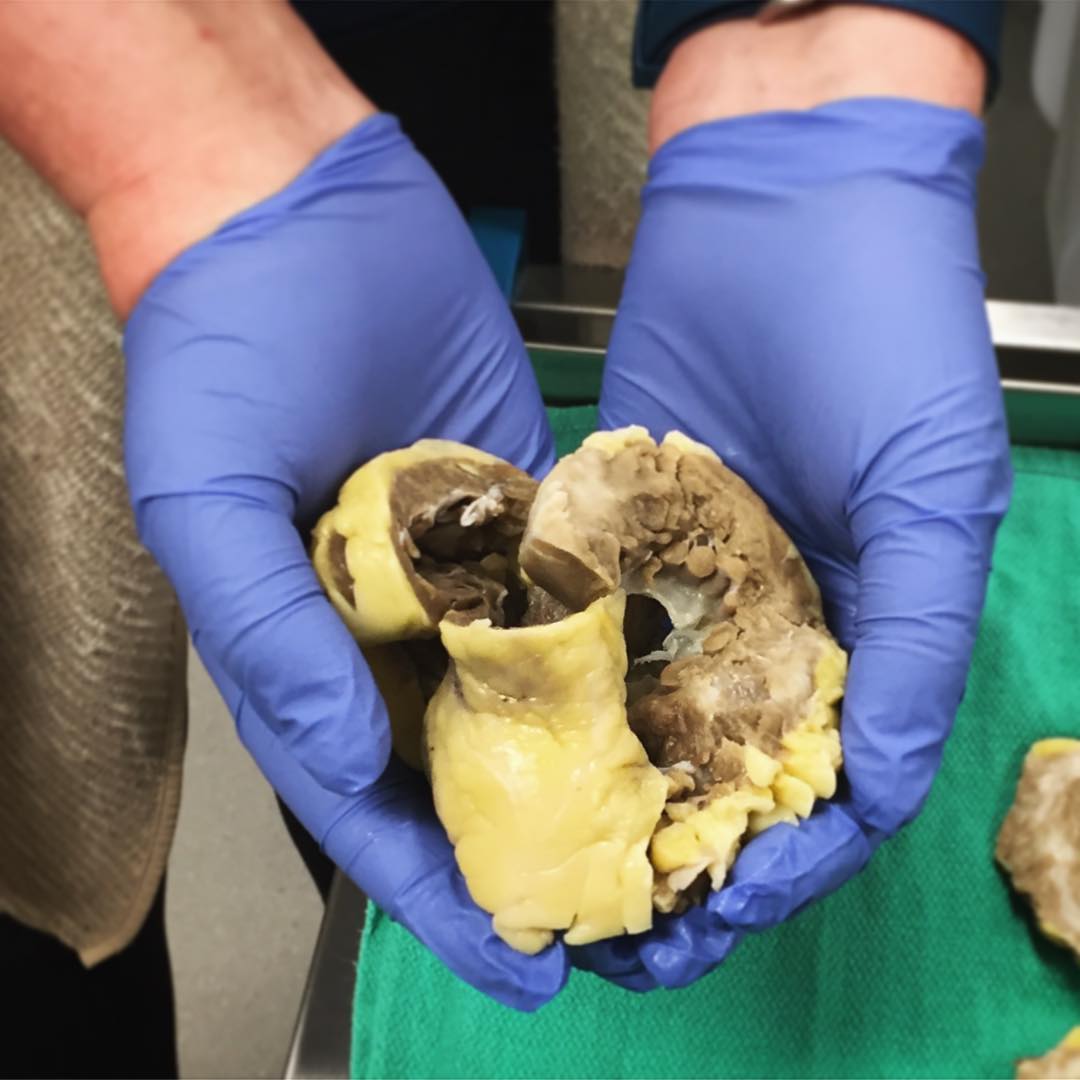
Leilani holding her heart after the transplant.
Lilly Stairs: And so, one other thing that I'm really curious about - just because I haven't had a lot of experience in this space - is to better understand thoughts around organ donation.
I know you have some interesting opinions on this, and I'd love to hear your thoughts on this space.
Leilani Graham: Yes. So, on the one hand, I'm a huge advocate for it. I wouldn't be here without it - that has taken me a long time to realize. And in the US, we're a little bit behind other countries in that space.
So, there's been talk of moving us to an opt out system versus an opt in system. Right now, you can either sign up online at registerme.org, or at the DMV, and that's opting in to saying I would donate my organs should I pass away.
Other countries have opt out so that everyone automatically would donate, and you could choose not to.
Leilani Graham: But the part that I'm really passionate about, again, kind of ties back into precision medicine, but really could be better described as transparency.
Right now, there is not a lot of information that a recipient can have about their donor, and vice versa. And part of that is for good reason, right? I mean, you have a grieving family who's just made an incredibly difficult decision. You have a family of a child or a sister or a brother or whatever who's essentially on death's door. And there's so many emotions that go into that. It's probably not a great idea to have them meeting face to face at the time.
That being said, I do think a lot of eventual therapies and treatment can be built off knowing more about where the organ came from, and how it's functioned in that donor beforehand.
Leilani Graham: So for me in particular, the donor heart was diagnosed with third degree AV block about a year after transplant. We didn't know anything about that electrical system when it went in. You're working in a very small timeframe hours-wise because of how long organs are viable outside of the body.
But if we were able to test for that, we might have known ahead of time, "Okay, Leilani will have to have a specific second therapy in order to make sure that she can be healthy with this new organ."
Lilly Stairs: Wow - okay. And so how has that impacted you today? Is this another thing that you sort of have to carry with you? Is it considered another disease?
Leilani Graham: Yes, so I ended up having to get a pacemaker for that.
Lilly Stairs: Oh, geez. Okay. Well, fun, just add it to the list, right?
Leilani Graham: Right? I should be getting corporate sponsorship from these biotech companies!
Lilly Stairs: And this is all so fascinating, because I think for those of us who maybe obviously haven't had to go through organ donation, this is really fascinating to know and understand. And I agree with you, you should be able to know all the kind of different details that are going into this organ that is being put into your body, right?
I'm glad that we're chatting about this now so that we can hopefully reach some wider spread awareness about it. Open up conversations about it, because that's what we need to be doing to move forward and make change.
Leilani Graham: Exactly, because it's a sticky topic, right? I mean, on the one hand, you don't wanna at all criticize the process or the fact that people are willing to give a part of themselves. That's so selfless and forward-thinking.
But at the same time, you do have to look at the data to ensure that our transplant recipients are able to live full, healthy lives and have that organ last as long as it possibly can.
Lilly Stairs: Well, thank you for sharing this, and we will keep an eye on the advocacy work that you are doing so that we can make sure we follow it and raise awareness. Hoping all of you at home will also take a peek! And remind us, where can people find you?

Leilani Graham: Yeah, so I'm on all of social media with the same handle, Leilani R. Graham. And my blog where I talk about my experience and do some writing is acalculatedrisk.net.
Lilly Stairs: I love that name, very cute.
Lilly Stairs: So, one other thing I wanted to talk to you about. We do a lot of work with the chronic illness community here at Clara Health, and we have a lot of members of our Breakthrough Crew (which Leilani is a brand-new member of) who are chronic illness patients.
And so, would you consider yourself a chronic illness patient?
Leilani Graham: Absolutely.
Lilly Stairs: Okay, and so, can you walk me through a little bit what that looks like? Because so much of us - and I speak from experience as an autoimmune disease patient - I always think of chronic illness in the autoimmune disease realm.
What's interesting is that we're starting to see cancer patients actually moving into what is called a chronic illness patient as well. Which is actually really amazing because cancer patients are no longer dying, they're living longer, but now they're living as a chronic illness patient.
And so, for you, can you tell me a little bit more about what that means for you as a chronic illness patient?
Leilani Graham: I mean, I think you hit the nail on the head there. Because we're able to access treatment that is allowing us to live longer, we get outside of that realm of having a fatal illness, and being a chronic illness.
So for me, transplant is by no means a cure. I'm still taking way more medications than I was pre-transplant. I still have concerns I have to look out for. I now have a suppressed immune system. So in some ways, I wouldn't consider myself an autoimmune patient, but I do have to watch out for similar things.
Leilani Graham: And so I think the same can be said for cancer patients who are in remission, but I think if you're diagnosed with anything that requires you to be at frequent doctor's appointments or have checkups at least once a year, you can fall into that bucket.
Because you're no longer this cured person who can stop living the lifestyle of a patient. So, I'm glad to see that the definition is expanding.
Lilly Stairs: Yeah, it's absolutely true. And I'm excited for the day where we actually have more cures. I know, hep C has reached a point where we have an official cure, which is kind of mind boggling to me, because I feel like at this point there are so few things that we have cures for.
But we're moving in that direction. We're getting there. And so, and thanks for sharing that. I think that's really interesting.

Lilly Stairs: And along the same lines of chronic illness, I thought it was so funny when I reached out to you and we were chatting - and I reached out to Leilani because, as many of you know, Clara Health moved out to San Francisco and Leilani is native to California Bay Area.
So, we were chatting, and I come to find out she knows our advisor, Anna Legassie. And I was like, how does she know her? And Anna's in the RA, rheumatoid arthritis space.
Leilani Graham: And on the East Coast.
Lilly Stairs: And on the East Coast. So can you tell me your journey to how you found her and why you were looking?
Leilani Graham: Yeah, absolutely. So, another complication I had as part of transplant was I have avascular necrosis in both my knees as a result of being on the wonder drug Prednisone.
Lilly Stairs: Oh, yes, everyone's favorite. Gotta love the moon phase, the can't sleep at night. Lots of energy, anxiety.
Leilani Graham: I've always said if I win the lottery, at least 50% is going to an alternative to steroids, yeah.
Lilly Stairs: Oh, my gosh. Somebody's gonna rig the lotteries that Leilani can win.
Leilani Graham: Exactly. Bring some DC funding for that. And so, when I was diagnosed with that, the most major treatment option is, unfortunately, knee replacements. So I started looking, who were other mid-20s, early 30s people who have had joint replacements. That's where I found Anna, and then also learned more about her story and about the RA community, and saw just how many similarities there were.
And I can't tell you how much that has helped me to be so open with some of the tribulations I face, particularly with my friends who don't suffer from chronic illnesses and have no insight into what it's like spending so much of your time in the health system.
Lilly Stairs: Wow, okay. So fascinating. And it just goes to show how valuable it is when patient advocates are out there sharing their stories and helping to support others. It really does make all the difference.
And I'm sure you've had so many patients who have come to you and said thank you for sharing your story, because it helps me get by to know that there are other people who are out there.
Leilani Graham: Right. And finding someone like Anna, it helped me to realize, "Okay, even if I do have to eventually get replacements, I mean, she's a triathlete. She's kicking butt."
Lilly Stairs: She is, she's awesome.
Leilani Graham: It gave me a lot of hope. So I think it's a mutually beneficial system.
Lilly Stairs: Awesome. And we've talked a little bit about this before, but you've been involved in some clinical research, it sounds like?
Leilani Graham: Yeah, mm-hmm.
Lilly Stairs: Can you tell me a little bit more about how you got involved in it, how you heard about it, why you do it?
Leilani Graham: Sure. So with all of my diagnoses, I've always fallen in the 2 to 3% chance that anything's gonna happen.
So I tend to get recruited very heavily at my home institution for research studies. I think I have a file in my closet that's like, this thick of all of the consent forms that I've signed. Would love to see that move to an electronic system, so anyone who needs a startup idea, there you go.

Leilani Graham: And I've also been involved in a mother-daughter study for a long time. I'm very close with my mom, and there was a psych study that was recruiting in middle school. So we've been followed for, I think, 10, almost 15 years now.
Lilly Stairs: Really? Tell me more about it.
Leilani Graham: So, that's a behavioral study looking at the relationships between mothers and daughters, and how adolescents kind of grow through puberty and into adulthood and how they perceive the world, essentially.
It's not a finished study, so I don't know what their eventual findings are. But I would say the impact has been so significant for me, because I was one of the first heart patients to be genetically tested for my mutation at my institution. My entire family was tested.
And it completely determined how we proceeded in our lives.
Because people like my sister, who has no mutations, doesn't have to worry about it, ever. People like me, who have double mutations, it's in the family planning and all that great stuff. So, so research studies have been an incredible part of my journey.
Lilly Stairs: You hit the lottery there.
Lilly Stairs: And you mentioned, and I'm gonna pry here a little bit, you mentioned family planning.
Leilani Graham: Yes.
Lilly Stairs: So, this is something, this is a topic that we've been discussing a lot with different applicants that we work with because family planning is a big factor for many chronic illness patients.
Leilani Graham: Yes.
Lilly Stairs: It's something that you have to think about when you're in your mid-20s, early 30s, mid-30s, whatever it may be. And so, granted, it doesn't sound like, based on the conversations we've had, that you're at that point in this moment. But I'm sure you've thought about it.
What are your thoughts around this? How do your illnesses that you're living with and the heart transplant and the mutations impact family planning?
Leilani Graham: That's a great question. I mean, I think that I've been so fortunate to, at my center, they were one of the first genetic programs dedicated specifically to the cardiac system.
And that's been a conversation I've been having with them since I was 19, which, admittedly, at that age, I really wasn't ready to start having a family. I was like, moving across the country to college is enough! But it's been considered part of my patient journey rather than sort of a tangent to it.
And I think that's what's so inherent, 'cause like you said, for people like me who are dealing with multiple complex diagnoses - and then I've got the genetics not working for me, it will be a specific plan to ensure, however I choose to have children, it's safe for me, safe for the baby. I consider it a joint decision with my team.
And I think it's important to start having those conversations early.
Lilly Stairs: It is, yeah.
Leilani Graham: So that you're not suddenly staring the biological clock in the face and going, "Wow, I wish I had a support network to help me with this."
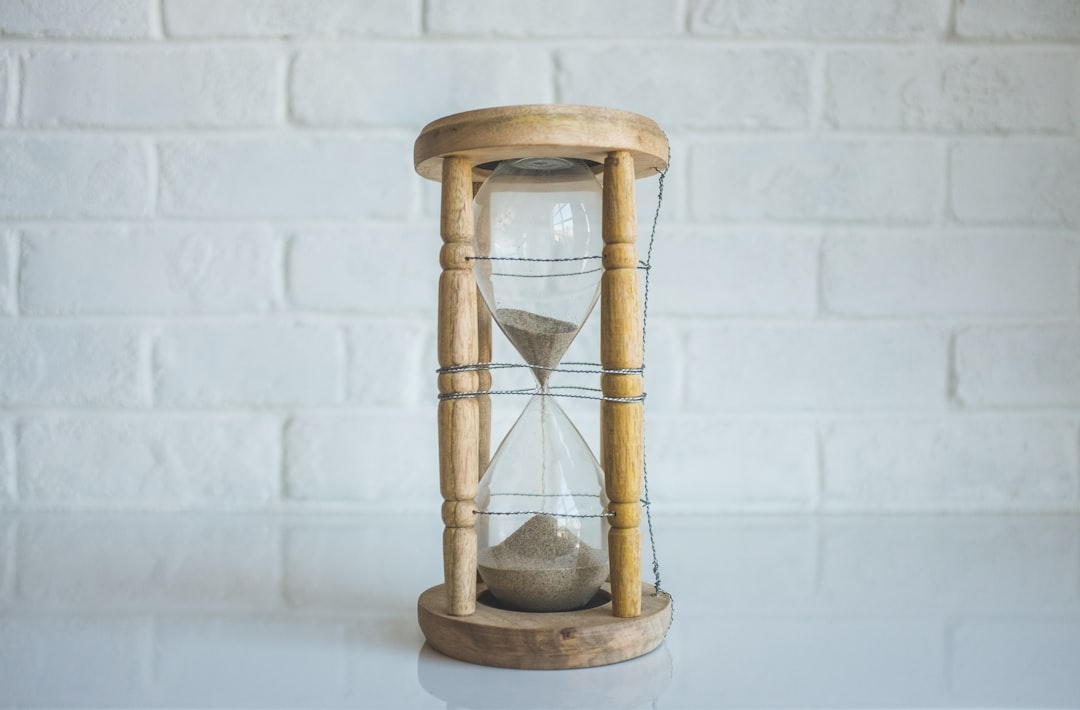
Lilly Stairs: Right, and an understanding of what next steps are. And that's something that I started to discuss. I actually specifically chose a gastroenterologist who is a leader in the space of how biologics impact children and mothers when they're pregnant and breastfeeding. And it's not because I am getting pregnant tomorrow, it's because I know that's five, 10 years out and I need to start thinking about that now.
I just want to have the peace of mind and the understanding that I have people in my corner that will help me when I get there. 'Cause it's a big life step, yeah, yeah.
Leilani Graham: And I would say that's something that has been really eye-opening for me in the networking I've done with other patients. Some of them say their transplant centers to shut them down, said "We're not talking about it."
Lilly Stairs: Interesting.
Leilani Graham: And that's so negative to hear, because it's completely demoralizing to a patient who maybe, their life trajectory was really to be a parent in some way.
Lilly Stairs: Yeah.
Leilani Graham: And I think that we need to have providers who are at least empathetic to the life goals that you have. And even if they're not comfortable helping you plan for those goals, they need to be giving you the resources through other centers or other providers, to be able to give you that.
Lilly Stairs: We need to be seeing - and this is something I've been talking about when I've been going to some different speaking engagements - we really need to be seeing physicians who are providing resources.
I know physicans have 10 minutes or less to see patients, but if you can't have that discussion when you're in the office, have resources ready to give to patients.
Leilani Graham: Have the humility to say:
Lilly Stairs: "I recommend going here or there or to somebody else."
Lilly Stairs: So, anyways, that is all, this has been just such a fascinating conversation. And we've covered so many different topics. I, of course, have to end our podcast by asking you, what patients have power means to you.
Leilani Graham: Oh, I like that. It means so much. I think it's a great heading for all of this advocacy work and connection work that all of us are doing in this space, but I think what it boils down to is that patients deserve an equal seat at the table.

Leilani Graham: Whether that's at conferences, at research trials, at planning committees, hospital design, medication design. I can't tell you how often I talk to somebody who goes "Oh, I went to this really cool big data or health thing and they go, but patients weren't really a part of that." And I'm like, "do we not recognize that patients are the end client at the end of the day?"
And in any other industry, they're the user. So that's using a little bit of tech speak, but yeah.
Lilly Stairs: Preach. You're right, you're my new favorite. Well, thank you so much for joining us, Leilani. Thank you all for listening in, watching. We will see you next week, looking forward to seeing you every week, hopefully. Come back to the Patients Have Power podcast.
Thanks, everybody!
Leilani Graham: Thanks for having me.
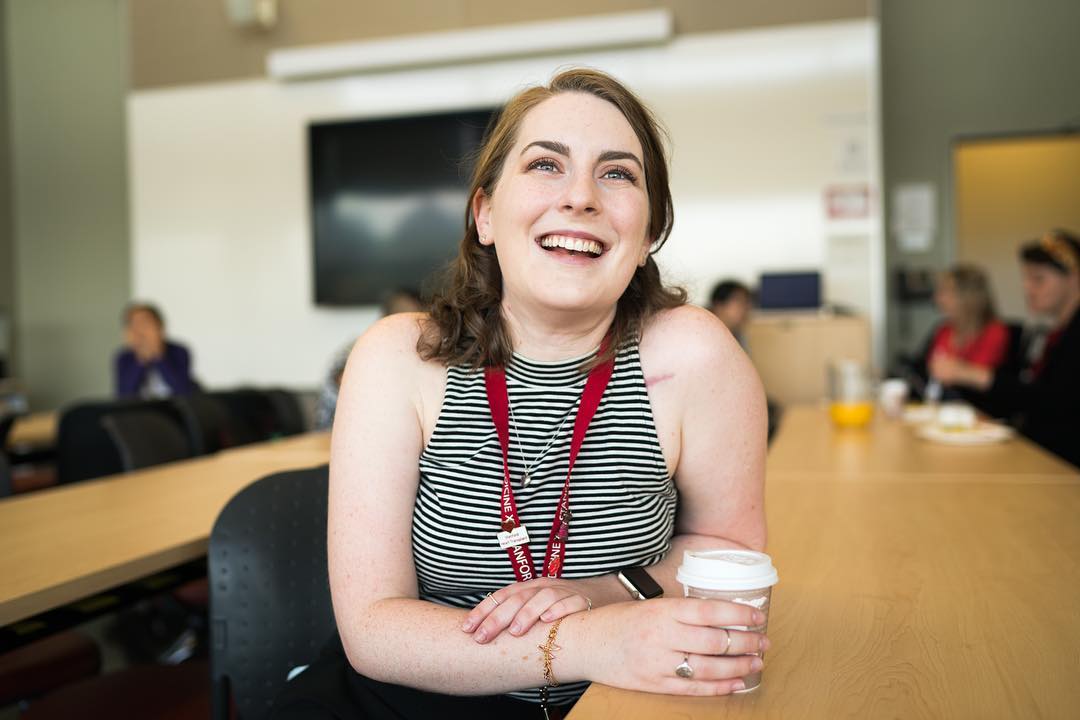
Keep following Leilani's journey on her website A Calculated Risk, twitter @LeilaniRGraham, and instagram @LeilaniRGraham!


